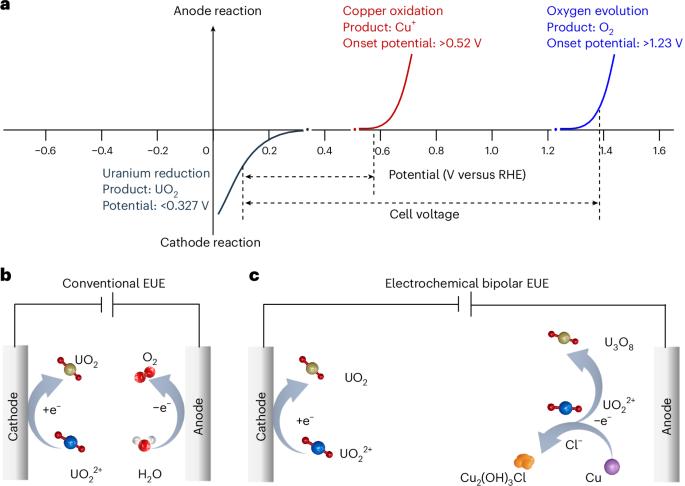超低电池电压双极电化学海水提铀
IF 27.1
1区 环境科学与生态学
Q1 ENVIRONMENTAL SCIENCES
引用次数: 0
摘要
从海水中高效提取铀有可能确保核燃料的充足和可靠供应,提供可负担得起的能源,同时将碳排放降至最低。在众多的提取方法中,电化学方法因其快速的动力学和材料再生能力而成为一种很有前途的选择。但该技术面临的主要挑战是能耗高、萃取效率低、选择性差。在这里,我们展示了一个双极电化学铀萃取(EUE)系统,该系统结合了铀种的阴极直接电还原和阳极的电化学辅助间接铀还原。EUE装置在仅0.6 V的超低电压下工作,对于铀浓度范围(1-100 ppm)的源显示出~100%的效率。该双极EUE系统在天然海水中具有优异的铀选择性(85.3%以上)、长期稳定性(45个循环)、低能耗(1,944 kWh kg - 1 U)和成本优势(83.2 kg - 1 U)。这项工作为电化学系统设计的可持续循环利用不同的废物资源开辟了一条途径。海水是铀最丰富的来源。这项工作展示了在超低电压下从海水中进行双极电化学采矿的过程,确保了最大的提取效率和最小的能耗。本文章由计算机程序翻译,如有差异,请以英文原文为准。

Bipolar electrochemical uranium extraction from seawater with ultra-low cell voltage
Efficient uranium extraction from seawater has the potential to secure an abundant and reliable supply of nuclear fuel, providing affordable energy with minimized carbon emissions. Among the many extraction methods, the electrochemical route has emerged as a promising choice owing to its fast kinetics and materials regeneration. The major challenges facing this technology, however, lie in its high energy consumption, low extraction efficiency and poor selectivity. Here we show a bipolar electrochemical uranium extraction (EUE) system that combines cathodic direct electroreduction of uranium species and electrochemistry-assisted indirect uranium reduction at the anode. The EUE device operates at an ultra-low voltage of merely 0.6 V, exhibiting an efficiency of ~100% for sources with a wide range of uranium concentrations (1–100 ppm). This bipolar EUE system in natural seawater displays excellent uranium selectivity (above 85.3%), long-term stability (45 cycles), low energy consumption (1,944 kWh kg−1 U) and cost advantage (US$83.2 kg−1 U). This work opens an avenue to the electrochemical system design for sustainable recycling of different waste resources. Seawater is the most abundant source of uranium. This work shows a bipolar electrochemical mining process from seawater at ultra-low voltages, ensuring maximized extraction efficiency and minimized energy consumption.
求助全文
通过发布文献求助,成功后即可免费获取论文全文。
去求助
来源期刊

Nature Sustainability
Energy-Renewable Energy, Sustainability and the Environment
CiteScore
41.90
自引率
1.10%
发文量
159
期刊介绍:
Nature Sustainability aims to facilitate cross-disciplinary dialogues and bring together research fields that contribute to understanding how we organize our lives in a finite world and the impacts of our actions.
Nature Sustainability will not only publish fundamental research but also significant investigations into policies and solutions for ensuring human well-being now and in the future.Its ultimate goal is to address the greatest challenges of our time.
 求助内容:
求助内容: 应助结果提醒方式:
应助结果提醒方式:


